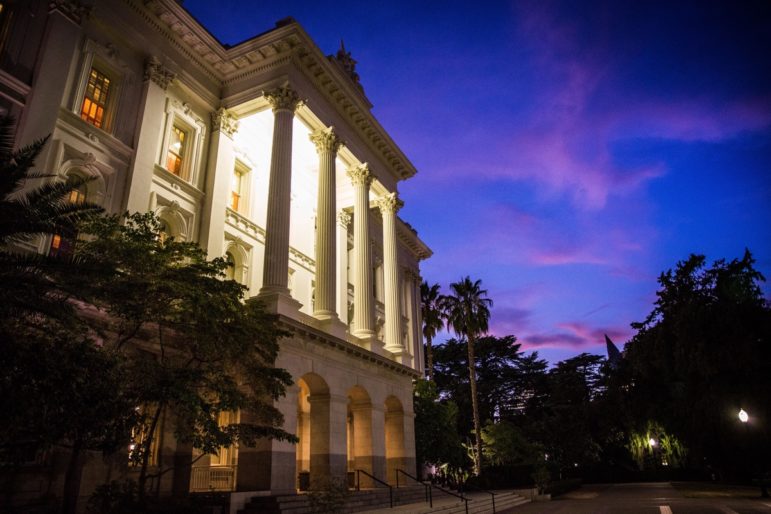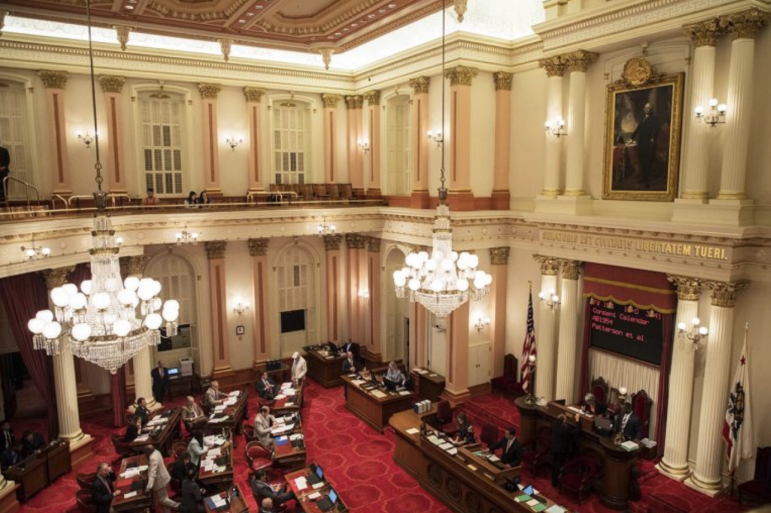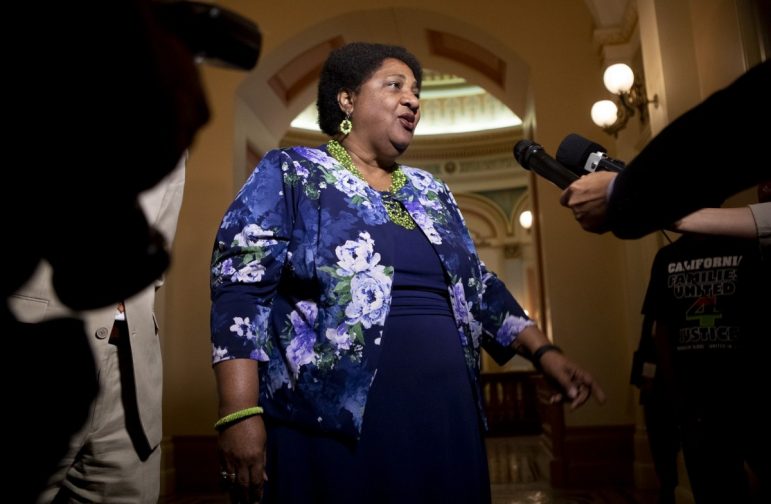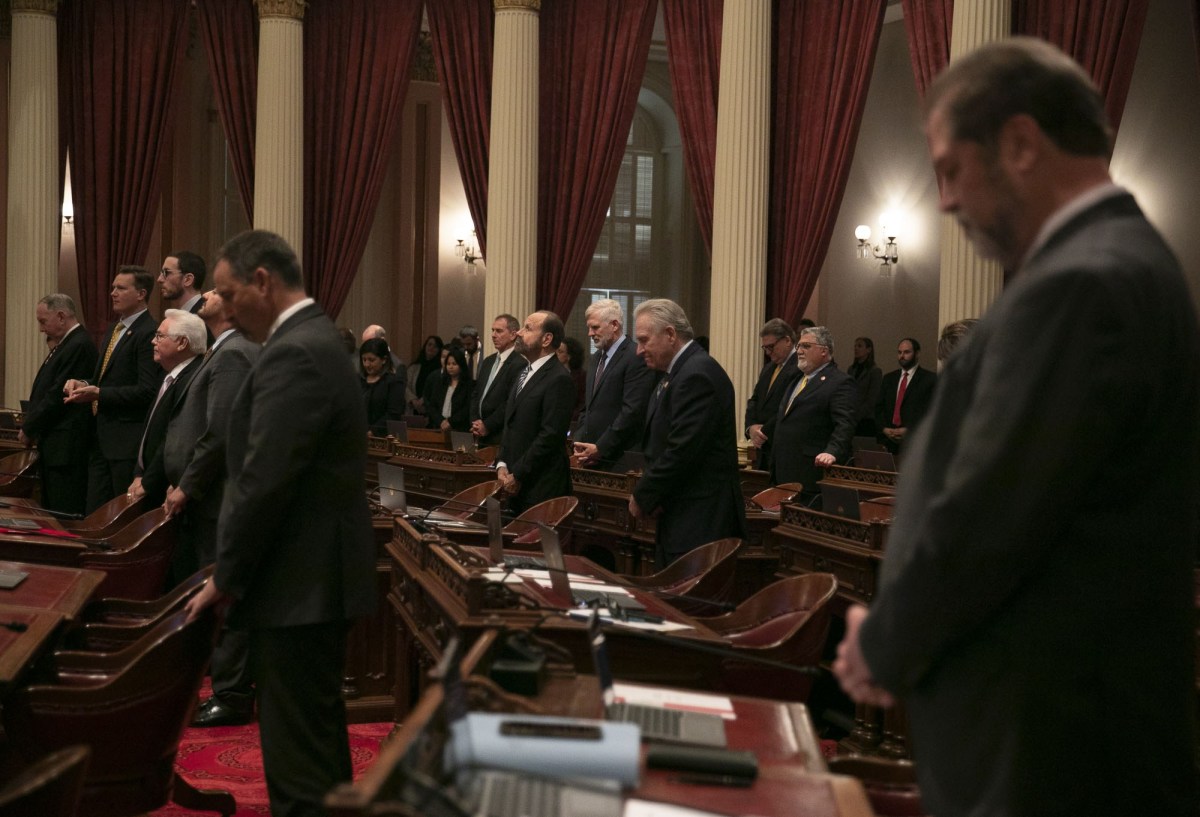In a year of radical upheaval, this much has remained constant: California’s elected representatives still aren’t all that representative.
For the third time in six years, CalMatters has compiled the demographics and self-identifications of the state’s legislators and constitutional officers. They still don’t much resemble the state they represent — although they’re getting closer. This year doesn’t quite break the record for number of women in the Legislature (it’s still only 32%) but voters elected a 25-year-old and the Legislature’s first openly bisexual member (both are the same person).
We’re officially running out of ways to say there are still a lot of older white guys kicking around the Capitol (no offense to older white guys).
But here are a few:
- The average age of legislators is 52; only eleven are under 40.
- State Sen. Steven Bradford, a Gardena Democrat, is now the only Black state senator.
- Straight, white dudes remain a formidable bloc — they comprise 41% of all legislators.
Find someone who looks like you (if you can) in this interactive tool, and then read below for the highlights:
Not born in the U.S.A.
Of 119 members of the Legislature (one seat is vacant), 13 were born outside the United States.
They include Los Angeles Democrat Wendy Carrillo and Westminster Republican Janet Nguyen, who came here as children, ferried by parents fleeing violence and political turmoil in El Salvador and Vietnam, respectively. They also include prosperity-seekers who arrived in California as adults, such as South Korea-born Irvine Republican Steven Choi. And some were born outside the country because their parents were in the U.S. military, among them Elk Grove Democrat Jim Cooper and Hesperia Republican Thurston Smith, both of whom were born on bases in Europe.
That roughly one in ten California legislators was born abroad shouldn’t be surprising: the state is home to roughly a quarter of the country’s foreign-born population.
It also stands out as a relative bastion of immigrant political representation. A report last year by New American Leaders, a national organization aimed at boosting the ranks of “new Americans” holding elected office, found about quarter of the California Legislature are either first- or second-generation immigrants.
That broader definition also includes the children of immigrants such as incoming Democratic Assemblymembers Alex Lee of San Jose and Carlos Villapadua of Stockton. All together, according to the report, the “new American” share of California’s legislature exceeds their state population by nearly 6 percentage points — more than any other state.
Nura Sediqe, a research fellow at New American Leaders and the report’s lead author, said she and her colleagues are updating numbers for the 2021 session. But California still likely sits at or very near the top.
“My sense is that the political culture in California has more open doors than in other states,” she said.
That isn’t just a product of the state’s diversity. There are plenty of states with large immigrant populations where state political power skews disproportionately born-in-the-USA.

What makes California different? A larger network of candidate-recruitment organizations, a longer history of politically active immigrant communities, and more encouragement from political parties could play a role, said Sadiqe.
“That’s what makes us scratch our head — places like New Jersey or even Texas,” she said. “What are the best practices in the state of California that could be used as a road map for these other states?”
Only one female Asian American lawmaker…again
In a Legislature with 120 seats, there is still a single female Asian American lawmaker. Assemblymember Nguyen, an Orange County Republican, was born in Saigon and served in the state Senate from 2014 to 2018. After losing re-election in 2018, she’s back in the other chamber.
“She has served extensively and she also set records,” said Linda Vo, a professor in the Asian American Studies department at UC Irvine. “So that gave her a lot of prominence locally and also in the Vietnamese American political world.”

Among her firsts, Nguyen was the first Vietnamese American elected to the state Senate. Little Saigon is part of her Assembly district and Orange County has one of the largest communities of Vietnamese Americans nationwide. The lawmaker landed one of a handful of new Republican seats in this year’s session. Her Democratic challenger, Diedre Nguyen — also born in Saigon — earned nearly 46% of the votes.
“Diedre Nguyen, who is in the Garden Grove City Council, you know she got a fair percentage of the votes as well. Maybe a decade ago, Diedre wouldn’t have been close,” Vo said. “In many ways, I think this is representative of the Vietnamese American community in the future.”
But statewide, of 17 competitive legislative races, few candidates were Asian American women. June Yang Cutter, a Republican, lost her Assembly race to the district’s incumbent, Democratic Assemblymember Brian Maienschein of San Diego.
And last year’s lone Asian American female lawmaker, Republican Ling Ling Chang, lost her state Senate race to Democratic challenger Josh Newman, a 56-year-old white man. Chang replaced Newman in a 2018 special election after he was recalled.
A record-high number of Latina lawmakers
This legislative session includes 19 Latina lawmakers and several of them will chair Assembly committees.
“I think it’s a great step that more Latinas are running for office, especially statewide office,” said Democratic state Sen. María Elena Durazo of Los Angeles, chair of the California Latino Legislative Caucus. “We want true representation based on the populations of California.”
Nearly 40% of Californians identify as Latino or Hispanic, according to census data. While Durazo said she feels very proud of the Legislative accomplishment, she added, “we’re still way below what we should be, but we’re definitely moving strongly in the right direction.”
Latinas represent a disproportionate amount of COVID-19 cases, face a disproportionate pay gap and are underrepresented in California’s corporate boards. In California, nearly 30% of Latinas faced job loss compared to 9% of white women. Nationwide, unemployment for Hispanic women jumped from nearly 6% to nearly 21% between February and April, according to the Pew Research Center

“Representation matters because we contribute in a significant way,” Durazo said. “We’re not going to be invisible anymore.”
How does Latina representation make a tangible difference? Durazo pointed to several policies they authored, including a crackdown on “predatory lending” by Democratic Sen. Monique Limón of Santa Barbara, the gig economy fight sparked by Democratic Assemblymember Lorena Gonzalez of San Diego and a law that requires employers to notify employees and local health departments of COVID-19 outbreaks by Democratic Assemblymember Eloise Reyes of San Bernardino.
This session will include the first Republican Latina elected to the California Senate Republican Caucus: Rosilicie Ochoa Bogh of Yucaipa, who defeated Democratic opponent and fellow Latina Abigail Medina.
“We have to stand with Latina women whether they are hotel housekeepers in San Diego or students in the Central Valley or women wanting to become CEOs in the Silicon Valley,” Durazo said. “We have to stand for all of them and not just for some of them some of the time.”
California’s LGBT Caucus still thriving
In 1983, Sen. John Laird made history as one of the first openly gay mayors in the United States. Twelve years later, Assemblymember Alex Lee was born.
Meet two of the newest members of California’s Legislative LGBT Caucus. Laird acknowledges the flourishing “age diversity in the caucus” of California’s lesbian, gay and bisexual legislators.
At age 70, he has watched that evolution firsthand. In his first stint in Sacramento as a member of the Assembly in the early 2000’s, he was one of the body’s first openly gay male members, co-founding what is now the California Legislative LGBT Caucus and paving the way for someone like Lee.
At just 25, the San Jose Democrat is bisexual, the first state legislator to openly represent the “B” in the LGBT Caucus’ name. (There has yet to be an openly transgender member).

Together, Laird and Lee bookend the history of gay, lesbian and bisexual political representation in state government. They also reinforce how much the caucus has grown and changed in its two decades.
The caucus’ founding cast was made up of four women, two men. All hailed from the densest parts of the Bay Area and Los Angeles and all were white.
“If you fast-forward to me coming in now, there are eight of us and four are people of color,” said Laird. “We’re spread out all over the state, not just the urbanized areas. We’re split evenly between men and women. The difference from the trailblazing crew is that there’s real diversity in the caucus now.”
Though the Legislature as a whole skews whiter, wealthier and more male than the state at large, sexual orientation is one of the few areas where the Legislature has achieved demographic parity. There are now eight legislators who identify as gay, lesbian, bisexual or queer. At about 7% that’s a tad higher than the estimated share of the state population.
The number alone understates the political power of the caucus. Toni Atkins, a Democrat from San Diego, serves as Senate Pro Tem making her one of the three most politically powerful people in the state alongside Assembly Speaker Anthony Rendon and Gov. Gavin Newsom. She’s also the only lesbian to have ever held that position. Scott Wiener, a San Francisco Democrat, is among the more prolific senators, routinely putting his name to some of the chamber’s most high-profile controversial bills.
But LGBT representation is not bipartisan: Every California legislator who does not identify as straight is a Democrat.
Only two Black women left in the Legislature
With two powerful Black lawmakers leaving the Legislature for political office elsewhere, the state is left with no Black female senators and only two Black women in the entire Legislature: Assemblymembers Sydney Kamlager and Autumn Burke, both Los Angeles Democrats.

Democratic Assemblymember Shirley Weber of San Diego led the fight against police use of force and authored the law that establishes a reparations committee in California. Gov. Gavin Newsom just selected Weber to fill a vacant secretary of state post, making her the first Black woman to hold that office.
“There is no one more fitting to be the first African American woman in this state’s 170-year history to serve in this role,” the California Legislative Black Caucus wrote in a statement. “Dr. Weber has admirably advocated for not only Black Californians, but all Californians.”
In Los Angeles, former state Sen. Holly Mitchell now helps lead the county as a member of the board of supervisors — which for the first time consists of all women. In Sacramento, Mitchell authored a law that requires implicit bias training for perinatal medical providers. She also carried the law that prevents landlords from discriminating against low-income renters with Section 8 vouchers. But in her absence, only one Black senator will remain.
Kamlager is running to fill Mitchell’s seat and has earned the former senator’s endorsement.
“I look forward to continuing her work in the CA Senate and to maintaining the diversity of this seat,” she said in a tweet.
But, if Kamlager moves to the state Senate, that will leave Burke as the only female Black lawmaker in the larger Legislative chamber.
Representing the fifth-largest economy in the world, California lawmakers shape the state and the country. While the state continues to creep toward representation, as our latest analysis found, the gains of those who are not white and male remain mostly slim.
And those of you who have regularly followed this CalMatters series: Despite the departure of Silicon Valley Senator Jim Beall, there are still a dozen lawmakers named Jim, James, Bob, Rob or Robert. But the long formidable Jim-Bob caucus shouldn’t rest on its laurels. After the 2020 election, the bloc of Joshes, Stevens and Daves are on the rise. So there’s a fresh injection of diversity there.
